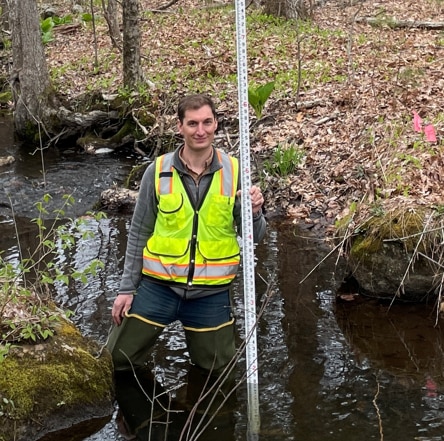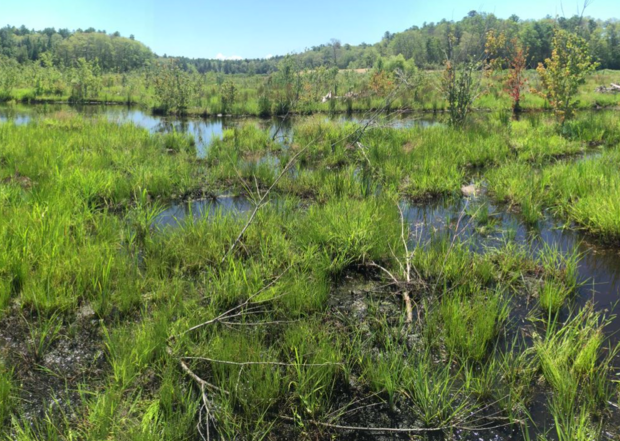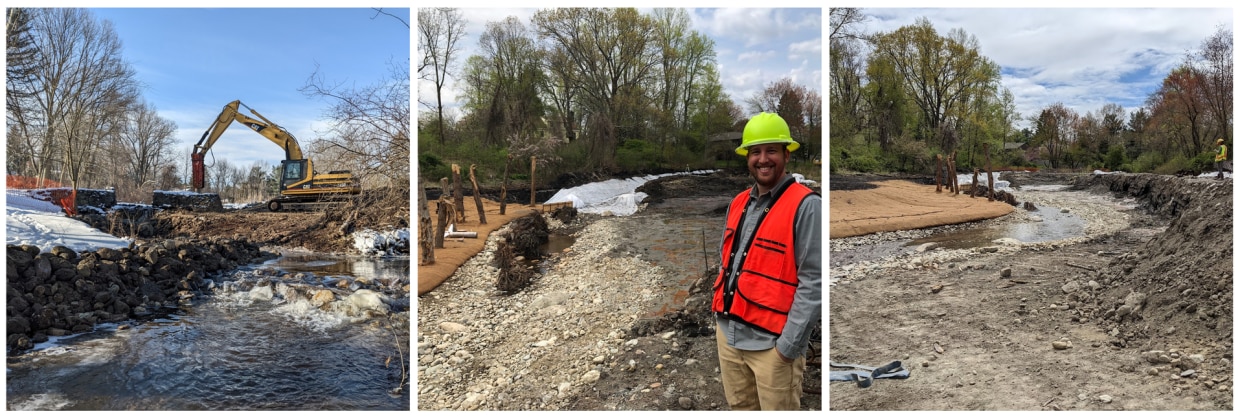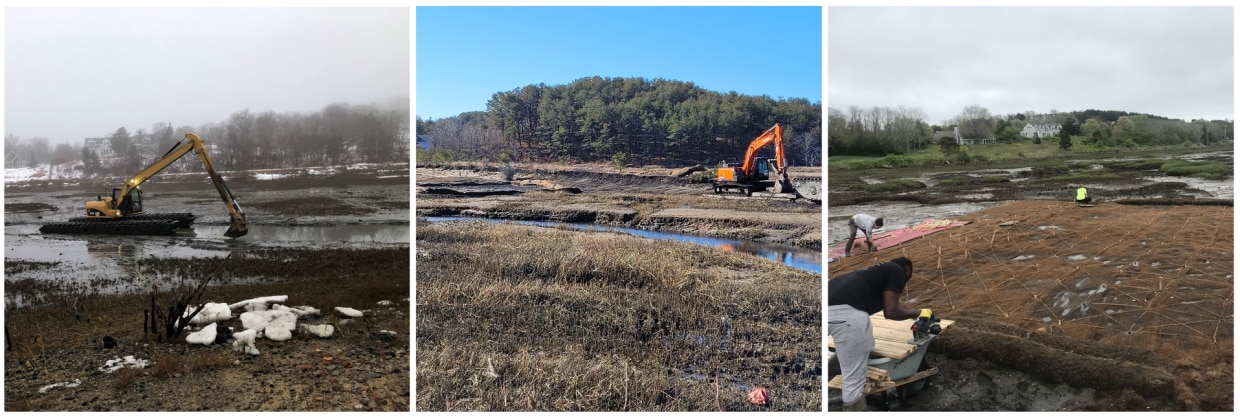Letter from the Director
Dear friends and colleagues,
As we transition into summer, DER’s work continues to ramp up. Construction is underway at the Traphole Brook dam removal detailed below, the Lyman Pond Dam removal in Southampton, and multiple culvert replacement projects throughout the state. It’s an exciting time to see restoration work in action!
This is also a great time to enjoy the beautiful outdoors that we work to protect. Many DER river and wetland restoration sites are open to the public and I encourage you to visit and get outside. You can walk the beautiful new trails and see the overlook at Lower Coonamessett River Restoration in Falmouth, or enjoy the scenery at MassAudubon’s Tidmarsh Wildlife Sanctuary—the site of a massive cranberry farm restoration. You can find these and other sites on our interactive project map.
I hope to see you on the river this spring and summer!
Beth Lambert, Director
Welcome New Staff
DER is excited to welcome new staff to our team! Please help us to welcome Holden Sparacino and Melissa Riley as the newest members of DER!
Melissa Riley
Melissa joins DER as our new Ecological Restoration Specialist with the Cranberry Bog Program. Prior to joining DER, she was an environmental scientist focusing on wetland mitigation and environmental permitting for highway and bridge projects. She is excited to be part of DER’s growing team and to apply her knowledge to the successful restoration of cranberry bogs!
Holden Sparacino
Holden joins DER as our new Ecological Restoration Grants Manager with the Stream Continuity program. Prior to joining DER, Holden managed grant programs supporting Vermont’s Conservation Districts to identify, design, and implement a variety of water quality projects. He also has background in research, grant writing, and coordinating community-based water quality monitoring groups through previous positions. He is excited to join DER’s Stream Continuity program and use his experience towards the successful ecological restoration of stream crossings throughout the Commonwealth.
DER anticipates adding several new staff members to our team in the coming months. If you or someone you know is qualified and interested in working with us, keep an eye on our DER is Hiring! webpage.
DER Awards $2.1 Million to Wetland and Restoration Projects
In May, DER announced $2,115,000 in grant funding to support eight river and wetland restoration projects. These projects will restore healthy habitat while helping to increase climate resilience, address aging infrastructure, and create opportunities for outdoor recreation.
In a press release, Governor Charlie Baker remarked that, “Investing in ecological restoration work is an important part of the Commonwealth’s preparation for the future as climate change impacts continue to be felt throughout the state. These projects demonstrate the leading role Massachusetts is taking in advancing restoration efforts to address environmental issues.”
Of the eight projects receiving funds, seven are part of DER’s Priority Projects Program, which is one of the vehicles by which DER pursues restoration projects that present the greatest benefits. The seven established Priority Projects that are receiving funding include wetland, salt marsh, and cranberry bog restoration projects, which will restore healthy habitat and provide benefits to Massachusetts communities, such as addressing the expected impacts of climate change. These projects include:
- The Marsh Island Restoration in Fairhaven, which will restore 11 acres of previously filled salt marsh within a larger 22-acre property along New Bedford Harbor, restore tidal flow, improve water quality, enhance fish and wildlife habitat, and provide opportunities for public access. This project was awarded $2,000,000.
- The Marston Mills Bogs Restoration in Barnstable, which is working to protect land and restore wetlands in approximately 55-acres of cranberry farmland. This project was awarded $6,000.
- The Pinnacle Bogs Restoration in Plymouth, which will restore approximately 15 acres of wetlands within a retired commercial cranberry farm while maintaining a perimeter trail system for future conversion to public open space. This project was awarded $10,000.
- The South Meadow Reserve Restoration in Carver, which restore approximately 30 acres of wetland on a retiring commercial cranberry farm. This project was awarded $20,000.
- The Tidmarsh Farms Restoration in Plymouth, which is the largest freshwater wetland project completed to date in Massachusetts. This project was awarded $10,000 to support habitat enhancement and biological monitoring.
- The Upper Bass River Wetland Restoration in Yarmouth, which will improve tidal flushing and water quality to the Bass River and its surrounding tributaries by replacing two undersized, tidal road-stream crossings and restoring a cranberry bog to a more natural state. This project was awarded $36,000.
- The Windswept Bogs Restoration in Nantucket, which will restore wetlands across approximately 37-acres of retired commercial cranberry farmland set within 241-acres of protected open space. This project was awarded $8,000.
The remaining project receiving funding is part of DER’s Culvert Replacement Training Initiative, which provides hands-on training to road managers at culvert upgrade sites throughout Massachusetts. Through this initiative, municipalities may receive direct technical assistance and funding to advance the replacement of select municipally-owned culverts at strategic locations while providing convenient, centralized learning locations for local road managers. This project is:
- The Rice Corner Cross Road Culvert Replacement Training Site in Brookfield, which is replacing a severely degraded culvert, providing passage for resident brook trout and other aquatic species and improving Brookfield’s infrastructure and storm resilience. This project was awarded $25,000.
Learn more about the wetland and restoration projects receiving funding in this press release.
Water Flows Freely at the Traphole Brook Dam Removal Site
The Traphole Brook Restoration Project has been in full swing in Norwood for the past few months. As part of this effort, the small Mill Pond Dam was removed from Traphole Brook within William Pezwick Park in February. The masonry dam was demolished and removed by construction crews in the course of one day, with excited partners there to witness. A reporter from WBUR Boston was able to capture the events and you can see some imagery and learn about the project and dam removal in the resulting WBUR story.
Although it may seem that once the dam is removed the project is over, in this case that is far from the truth and work was only just beginning! With the adjusted water flows due to the dam removal, the stream bed needed to be reconstructed. To accomplish this task, the brook itself was diverted around the construction area. In May, crews reconnected the channel and water flowed through a portion of the newly-constructed Traphole Brook, completing the first phase of this exciting project. The remainder of the project is slated for completion in July 2022.
The Traphole Brook Restoration Project was first designated as a DER Priority Project in 2018, making it eligible to receive technical support and/or funding from DER. It has continued to move forward through the incredible support from many project partners including the Town of Norwood, Neponset River Watershed Association, Greater Boston Trout Unlimited, US Fish & Wildlife Service, Massachusetts Department of Environmental Protection, and MassWildlife, as well as additional funding from the Municipal Vulnerability Preparedness Program and the Natural Resources Damages Program.
Traphole Brook is a Coldwater Fishery Resource that joins the Neponset River in Norwood. The brook is home to one of the few remaining wild Eastern brook trout populations in the greater Boston area. This project will restore habitat for coldwater species such as Eastern brook trout, improve public safety, and help the Town of Norwood increase the storm resiliency of an important town road and build resilience to climate change.
Project Highlight: Eagle Neck Creek Restoration
Eagle Neck Creek is a 16-acre tidal marsh that flows into Pamet Harbor and Cape Cod Bay. Unfortunately, this system has become severely degraded. A failing culvert and a railroad berm have created two tidal restrictions that have obstructed natural tidal flushing and flow to the system, restricting wildlife movement, impacting water quality, and impairing basic salt marsh functions.
The Eagle Neck Creek Restoration Project is working to address these issues. Partnering with the Town of Truro, the USDA Natural Resources Conservation Service, and the National Park Service’s Cape Cod National Seashore, DER is working to remove the two tidal restrictions that are impacting the system in order to restore salt marsh functions that will benefit coastal wildlife. To do this, the project team is dredging the tidal creek to remove remnants of the abandoned railroad embankment and to improve flow, planting wetland plants to stabilize the sediment and build important habitat, and reconstructing the failing culvert. Construction work on this project began in 2021 and is expected to be completed by the end of this summer, benefiting shellfish, finfish, and many other coastal wildlife.




